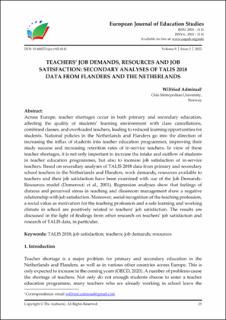Teachers’ job demands, resources and job satisfaction: Secondary analyses of TALIS 2018 data from Flanders and the Netherlands
Peer reviewed, Journal article
Published version
Permanent lenke
https://hdl.handle.net/11250/3048931Utgivelsesdato
2022Metadata
Vis full innførselSamlinger
- Publikasjoner fra Cristin [3269]
- SPS - Documents [424]
Originalversjon
European Journal of Education Studies. 2022, 9 (2), 25-47. http://dx.doi.org/10.46827/ejes.v9i2.4141Sammendrag
Across Europe, teacher shortages occur in both primary and secondary education, affecting the quality of students’ learning environment with class cancellations, combined classes, and overloaded teachers, leading to reduced learning opportunities for students. National policies in the Netherlands and Flanders go into the direction of increasing the influx of students into teacher education programmes, improving their study success and increasing retention rates of in-service teachers. In view of these teacher shortages, it is not only important to increase the intake and outflow of students in teacher education programmes, but also to increase job satisfaction of in-service teachers. Based on secondary analyses of TALIS 2018 data from primary and secondary school teachers in the Netherlands and Flanders, work demands, resources available to teachers and their job satisfaction have been examined with use of the Job Demands-Resources model (Demerouti et al., 2001). Regression analyses show that feelings of distress and perceived stress in teaching and classroom management show a negative relationship with job satisfaction. Moreover, social recognition of the teaching profession, a social value as motivation for the teaching profession and a safe learning and working climate in school are positively related to teachers’ job satisfaction. The results are discussed in the light of findings from other research on teachers’ job satisfaction and research of TALIS data, in particular.

